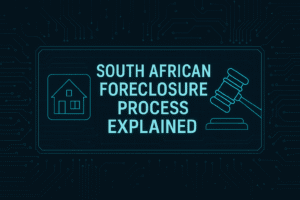The South African Foreclosure Process Explained: Your Path to Avoiding Disaster
What If That Knock Isn’t a Neighbour? Facing the Nightmare of Foreclosure
Did you know that thousands of South African families face the terrifying prospect of losing their homes each year? It’s a statistic that chills you to the bone. Imagine this: You’ve worked tirelessly, poured your heart and soul, and every spare cent into creating a safe haven for your family. Your home isn’t just bricks and mortar; it’s memories, security, your piece of the South African dream. Then, life throws a curveball – unexpected job loss, a sudden illness, a struggling business. The bills pile up. The dread builds. You start missing bond payments. Suddenly, the fear isn’t just abstract; it’s a registered letter, a phone call from the bank, the looming threat of the Sheriff arriving at your door. That knock you hear… what if it’s not a friendly neighbour, but the start of your worst nightmare – the foreclosure process?
This isn’t just a financial problem; it’s an emotional tidal wave threatening to pull you under. The stress feels unbearable, the future uncertain. You feel trapped, isolated, and maybe even ashamed. Where do you even begin?
The Crushing Weight: Understanding the Emotional Toll of Facing Foreclosure
If you’re reading this because foreclosure is a real possibility, please know you’re not alone, and the feelings you’re experiencing are completely valid. The fear is paralyzing – fear of homelessness, fear of judgment, fear for your family’s future. Sleepless nights become the norm, punctuated by frantic calculations and a sense of impending doom. Dealing with banks and lawyers can feel like battling giants; the legal jargon is confusing, the process opaque, and the constant pressure relentless.
It’s easy to feel overwhelmed, believing there’s no way out. You might be receiving letters filled with complex legal terms – Summons, Default Judgment, Warrant of Execution – each one amplifying the anxiety. The feeling of losing control is devastating. Your home, once a source of pride and security, now feels like a source of immense stress and vulnerability. This emotional turmoil makes it incredibly difficult to think clearly and make rational decisions, precisely when you need to the most. We understand this pain intimately; it’s the driving force behind why we’re dedicated to helping homeowners navigate this crisis.
Demystifying the Legal Maze: The South African Foreclosure Process Step-by-Step
Knowledge is power, especially when facing a daunting legal process. Understanding the stages of foreclosure in South Africa is the first crucial step towards regaining some control and exploring your options effectively. While the specifics can vary slightly, the general process initiated by the bank (the creditor) typically follows these steps:
1. Default and Letter of Demand (Section 129 Notice)
It usually starts when you fall behind on your bond repayments (default). Before initiating legal action, the bank is legally obligated under the National Credit Act 34 of 005 to send you a Section 129 notice. This letter informs you that you are in default and advises you of your right to refer the matter to a debt counsellor, alternative dispute resolution agent, consumer court, or ombud with jurisdiction, with the intent to resolve the dispute or agree on a plan to bring payments up to date. Ignoring this notice is a critical mistake. It’s your first official warning and a window of opportunity to act.
Key Takeaway: This notice isn’t the end; it’s a mandatory step by the bank and an invitation for you to engage proactively.
2. Summons
If you don’t respond adequately to the Section 129 notice or fail to make arrangements, the bank’s attorneys will likely issue a Summons. This is a formal court document informing you that legal action has been initiated to recover the debt and potentially foreclose on your property. It will be delivered by the Sheriff of the Court. You typically have a limited time (usually 10 business days) to file a Notice of Intention to Defend if you dispute the claim or the amount.
Key Takeaway: Receiving a Summons is serious. Seek legal advice or expert assistance immediately to understand your rights and options for defence.
3. Application for Default Judgment
If you don’t defend the Summons, the bank will apply to the court for a Default Judgment. This is a court order confirming that you owe the debt. Crucially, alongside this, the bank will usually apply for an order declaring your property “specially executable.” This means the court grants the bank permission to sell your home to recover the outstanding debt.
South African courts are required to consider all relevant circumstances before granting an execution order against a primary residence, including whether alternative means exist to satisfy the debt. A judge must set a reserve price for the sale in execution to prevent the property from being sold for an unreasonably low amount. You can find more information on consumer rights and credit regulations from the National Credit Regulator (NCR).
Key Takeaway: This is a critical stage where the court officially permits the sale of your home. Judicial oversight exists, but proactive steps are far more effective.
4. Warrant of Execution
Once judgment is granted and the property declared executable, the court issues a Warrant of Execution. This document authorizes the Sheriff of the Court to attach your property and arrange for its sale via public auction – the dreaded “Sale in Execution.”
5. Sale in Execution (Auction)
The Sheriff will advertise the auction (often in the Government Gazette and local newspapers). The property is then sold to the highest bidder. The proceeds are used to settle the outstanding debt, legal costs, and Sheriff’s fees. If the sale price doesn’t cover the full debt (which is depressingly common in forced sales), you may *still* owe the bank the remaining shortfall. This is a devastating outcome, leaving you homeless *and* still in debt.
Key Takeaway: The auction is the final, often financially disastrous, stage. Avoiding it should be your primary goal.
Client Success Story 1: The Ndlovu Family’s Relief
Mrs. Ndlovu contacted us in tears after receiving a Summons. Her husband had been retrenched, and they’d fallen behind. They felt paralyzed by fear and the complexity of the documents. “We thought we had no choice but to lose our home,” she shared. We immediately helped them understand the process and their timeline. By engaging with their bank proactively, facilitated by Real Estate Assist , we helped them negotiate a temporary payment arrangement, giving them breathing room while Mr. Ndlovu found new employment. They avoided judgment and kept their home. Understanding the process early was key to their success.
Beyond the Courtroom: Proactive Solutions to Stop Foreclosure in its Tracks
Understanding the bleak legal path of foreclosure is essential, but dwelling there breeds despair. The truly empowering knowledge lies in understanding the alternatives. The legal process is the bank’s final resort; often, there are far better solutions available *before* it reaches the point of no return. This is where a proactive strategy becomes your lifeline.
Waiting and hoping the problem disappears is never the answer. Taking decisive action, even when it feels difficult, can dramatically change your outcome. Here are some powerful alternatives to consider:
1. Renegotiate with Your Bank
Banks are often more willing to negotiate than you might think, especially early on. They generally prefer *not* to foreclose, as it’s a costly and time-consuming process for them too, often resulting in losses. You might be able to negotiate:
- A Payment Holiday: A temporary pause on payments.
- Reduced Instalments: Lowering your monthly payments for a period.
- Capitalizing Arrears: Adding the missed payments to your total loan balance (use with caution, as it increases overall debt).
Approach: Be honest about your situation, provide evidence (like retrenchment letters), and propose a realistic repayment plan.
2. Debt Counselling (Debt Review)
If you’re over-indebted (unable to meet all your financial obligations), a registered Debt Counsellor can assess your situation. They can negotiate with all your creditors (including the bank) to restructure your debts into a single, affordable monthly payment plan. While under debt review, creditors generally cannot take legal action against you regarding the debts included in the review.
Consideration: This is a formal process with implications for your credit record, but it can provide significant protection and relief.
3. The Strategic Sale: Selling Your Property Before Auction
This is often the most overlooked, yet potentially most powerful, solution, especially if keeping the home is financially unsustainable. Selling your property on the open market, Before the bank forces an auction, offers several crucial advantages:
- Higher Sale Price: Properties typically fetch a significantly better price on the open market compared to a forced Sale in Execution auction, where bargain hunters dominate.
- Control Over the Process: You (or your chosen representative) manage the sale, not the Sheriff.
- Avoiding Auction Trauma: You bypass the stress and uncertainty of the auction process.
- Potential for Surplus Funds: A higher sale price increases the likelihood of covering the outstanding bond *and* potentially walking away with some remaining equity (cash in your pocket).
- Protecting Your Credit Record: Settling the debt through a managed sale is far less damaging to your credit profile than a foreclosure judgment and auction shortfall.
- Stopping the Legal Process: A successful sale agreement can halt the foreclosure proceedings in their tracks.
This is where specialist assistance can make all the difference. Companies like Real Estate Assist focus specifically on helping homeowners in this exact situation. We understand the urgency and the need for a swift, efficient sale that maximizes value and minimizes stress. We can often present cash offers or leverage our network to find buyers quickly, negotiating directly with the bank on your behalf to pause legal action while the sale proceeds.
Client Success Story 2: Mr. Singh’s Dignified Exit
Mr. Singh faced imminent auction after a business venture failed. The stress was impacting his health. He felt resigned to losing everything. He reached out to Real Estate Assist just weeks before the scheduled auction date. “I just wanted it over, but I dreaded the auction,” he explained. We immediately assessed the property and presented a fair cash offer. Crucially, we liaised with the bank’s attorneys, providing proof of the impending sale, and secured a postponement of the auction. The sale concluded quickly. Mr. Singh settled his entire bond, avoided the trauma and stigma of auction, protected his credit score from further damage, and even received a small surplus. He was able to move forward with dignity.
Why Proactive Solutions Work
The common thread? Action. Whether it’s negotiating, seeking debt review, or initiating a strategic sale, taking control shifts the power dynamic. You move from being a passive victim of the process to an active participant seeking the best possible resolution. The South African foreclosure process is designed to recover debt for the creditor, but it doesn’t have to result in financial ruin for the homeowner. There are pathways to mitigate the damage, preserve dignity, and sometimes even retain your home or equity.
Don’t Let Foreclosure Define Your Future: Take Control Today
Facing foreclosure is undoubtedly one of the most stressful experiences a homeowner can endure. The legal process is complex, the emotional toll is immense, and the stakes couldn’t be higher. But understanding the steps involved and, more importantly, the powerful alternatives available, can transform fear into focused action.
Remember the key takeaways: The Section 129 notice is a call to engage, not surrender. The legal process has stages, but proactive intervention can halt it. Alternatives like negotiation, debt counselling, and strategically selling your property before auction offer lifelines that can prevent the devastating consequences of a forced sale.
You don’t have to navigate this overwhelming journey alone. Waiting allows the situation to escalate, limiting your options and increasing the pressure. The sooner you act, the more power you retain to shape a better outcome.
Real Estate Assist can help Stop your foreclosure and Stop Your Repossession and Stop Legal Action!
Stop the sleepless nights and constant worry. It’s time to explore Your specific options and find the best path forward for you and your family. Don’t let the bank dictate your future.



